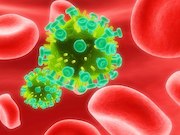Mosaic HIV-1 Vaccine Induces Responses in Humans, Monkeys


THURSDAY, July 12, 2018 — A mosaic adenovirus serotype 26 (Ad26)-based HIV-1 vaccine induces immune responses in humans and rhesus monkeys, according to a study published online July 6 in The Lancet.
Dan H. Barouch, M.D., from Harvard Medical School in Boston, and colleagues conducted a multicenter, randomized, placebo-controlled, phase 1/2a trial involving 393 participants recruited from 12 clinics in east Africa, South Africa, Thailand, and the United States. Healthy HIV-1-uninfected participants who were considered at low risk for HIV-1 infection were randomized to one of seven vaccine combination groups or a placebo group. Four vaccinations were administered over a period of 48 weeks. A parallel study was performed to assess the immunogenicity and protective efficacy of the same Ad26-based mosaic vaccine regimens in rhesus monkeys.
The researchers found that all vaccine regimens demonstrated favorable safety and tolerability. Mild-to-moderate pain at the injection site was the most commonly reported solicited local adverse event. In humans, the mosaic Ad26/Ad26 plus high-dose gp140 boost vaccine was the most immunogenic and elicited Env-specific binding antibody responses, antibody-dependent cellular phagocytosis responses at week 52, and T-cell responses at week 50 (100, 80, and 83 percent, respectively). In rhesus monkeys, Ad26/Ad26 plus gp140 boost induced similar magnitude, durability, and phenotype of immune responses.
“The mosaic Ad26/Ad26 plus gp140 HIV-1 vaccine induced comparable and robust immune responses in humans and rhesus monkeys,” the authors write.
Several authors disclosed financial ties to pharmaceutical companies, including Janssen Vaccines & Prevention, which funded the study.
Abstract
Full Text (subscription or payment may be required)
Editorial (subscription or payment may be required)
Posted: July 2018
Source: Read Full Article




